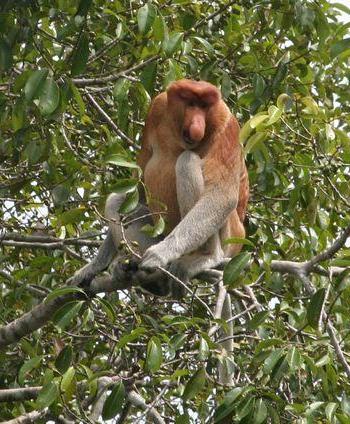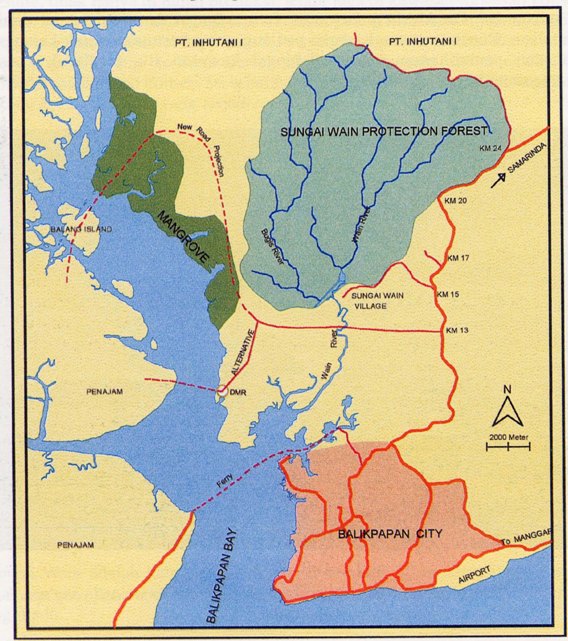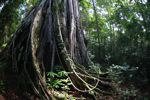Scientists with the Association for Tropical Biology and Conservation (ATBC) have released a resolution opposing the current development plan for a road and bridge crossing Balikpapan Bay in the Indonesian state of Kalimantan. The resolution states that the plan threatens not only the fragile ecosystems within the bay, but of the nearby mangroves as well as the Sungai Wain forest and its watershed, vital for local industry and people. According to ATBC, the plan could be easily remedied by officials picking an alternate route, which is also favored by locals since it would be 80 kilometers shorter.
“This bridge and road would imperil some of the most important wildlife habitats remaining in West Kalimantan. Given that there are clearly viable alternatives to the bridge project that are far less harmful, it’d be utterly illogical for it to proceed,” said William Laurance, one of the world’s foremost tropical conservationists and scientists. Laurance is currently a Distinguished Research Professor at James Cook University.
 Proboscis monkeys are endemic to Borneo. They require both mangroves and rainforest to thrive. Photo by: Rhett A. Butler. |
The resolution by ATBC, the world’s largest scientific organization devoted to the study of tropical ecosystems, warns that the project would threaten a variety of key species in the area, including dugongs, Irrawaddy dolphins, saltwater crocodiles and green sea turtles in the bay; proboscis monkeys and fish in the adjacent mangroves; as well as Sunda clouded leopards, sun bears, white-fronted langurs, and a reintroduced community of Bornean orangutans in Sungai Wain forest. The forest is also home to over 250 bird species making it a part of the Balikpapan-Samarinda Important Bird Area (IBA). Given the wealth of wildlife, primatologist Stanislav Lhota told mongabay.com in January that the area is ripe for sensible eco-tourism projects.
However, warns the ATBC resolution, all of this could be lost if developers cut a road along the forest’s edge, allowing people easier entry to its riches: “uncontrolled access to [the Sungai Wain forest] will almost certainly result in a major increase in settlements, farming, illegal logging, and land speculation that will threaten native habitats and lead to increased fires and wildlife poaching.”
As important as the area is for biodiversity, it is equally important for local people. The Sungai Wain forest provides one of the region’s only undiminished watersheds used for in local industry, while “the bay itself includes a variety of freshwater, brackish, and mangrove habitats that provide vital breeding areas for commercially important fish and crustacean species that help to sustain local fisheries,” according to the resolution.
ATBC endorses an alternate route that would avoid the mangrove stands and the Sungai Wain forest altogether and have less impact on the bay. Local officials have also come forward in favor of this route given that it is significantly shorter (80 kilometers) than the current one.
The resolution “urges the Federal Government of Indonesia and the Provincial Government of East Kalimantan to join with local authorities to support” the alternate route.
The island of Borneo has lost nearly 50 percent of its forest cover since the 1970s, an impact that has been felt in Kalimantan—the largest area of Borneo—as much as any other region on the island. This staggering loss of forests has jeopardized the future of innumerable species; produced vast greenhouse gas emissions; and diminished important ‘ecosystem services’, such as clean water, pollination, food and fish production.
“Most coastal and estuarine ecosystems of East Kalimantan have been devastated, and so it’s vital to protect the few ecologically viable areas that remain,” Laurance says.
For a more detailed look at the issue of development on Balikpapan Bay: Bridge development in Kalimantan threatens rainforest, mangroves, and coral reef.
A few notable species in the area:
Mammals:
Endangered:
Bay cat (Pardofelis badia)
Bornean orangutan (Pongo pygmaeus)
Bornean gibbon (Hylobates muelleri)
Flat-headed cat (Prionailurus planiceps)
Proboscis monkey (Nasalis larvatus)
Vulnerable:
Bornean slow loris (Nycticebus menagensis)
Dugong ( Dugong dugon)
Irrawaddy Dolphin ( Orcaella brevirostris)
Marbled cat (Pardofelis marmorata)
Pig-tailed macaque (Macaca nemestrina)
Sun Bear (Helarctos malayanus)
Sunda clouded leopard (Neofelis diardi)
Western tarsius (Tarsius bancanus)
White-fronted langur (Presbytis frontata)
Least Concern:
Maroon langur (Presbytis rubicunda)
Leopard cat (Prionailurus benhalensis)
Long-tailed macaque (Macaca fascicularis)
Silvered langur (Trachypithecus cristatus)
Birds:
Endangered:
Bornean Peacock Pheasant (Polyplectron schleiermacheri )
Storm’s Stork (Ciconia stormi)
Vulnerable:
Blue-headed Pitta (pitta baudii)
Bornean Wren-babbler (Ptilocichla leucogrammica)
Near Threatened:
Bornean Bristlehead ( Pityriasis gymnocephala)
Bornean Ground Cukoo ( Carpococcyx radiceus)
Reptiles/Amphibians:
Endangered:
False gavials, reports of a few surviving individuals (Tomistoma schlegelii)
Green sea turtles (Chelonia mydas)
Least Concern:
Saltwater Crocodile ( Crocodylus porosus)

Map of provincial road and bridge, as well as alternative. Image courtesy of Stanislav Lhota.
Related articles
Scientists commend Indonesia for conservation measures, but urge immediate action on forests and peatlands

(07/23/2010) Scientists convening at the annual Association for Tropical Biology and Conservation (ATBC) meeting in Sanur, Bali urged Indonesia’s leaders to strengthen measures to protect the country’s biologically-rich ecosystems. In a resolution issued on the final day of the five-day conference, ATBC commended Indonesia for recent moves to protect forests, including a pledge to cut illegal logging and a billion dollar partnership with Norway to reduce deforestation and forest degradation, but asked the government to immediately implement a planned moratorium on new forestry concessions on peatlands and primary forest lands.
Indonesia’s forests are a global heritage, says VP
(07/21/2010) The vice president of Indonesia on Wednesday urged scientists and the broader international community to help Indonesia find a balance between conservation and natural resource use.
Bridge development in Kalimantan threatens rainforest, mangroves, and coral reef
(01/03/2010) Balikpapan Bay in East Kalimantan is home to an incredible variety of ecosystems: in the shallow bay waters endangered dugong feed on sea grasses and salt water crocodiles sleep; along the bay proboscis monkeys leap among mangroves thirty meters tall and Irrawaddy dolphins roam; beyond the mangroves lies the Sungai Wain Protection forest; here, the Sunda clouded leopard hunts, sun bears climb into the canopy searching for fruits and nuts, and a reintroduced population of orangutans makes their nests; but this wilderness, along with all of its myriad inhabitants, is threatened by a plan to build a bridge and road connecting the towns of Penajam and Balikpapan.
